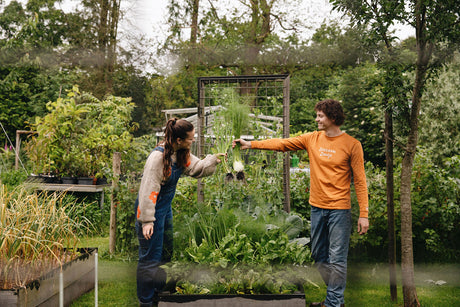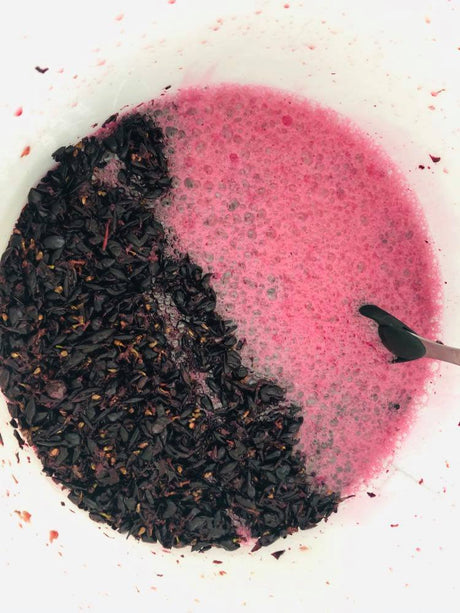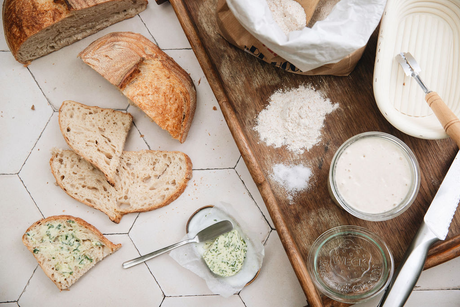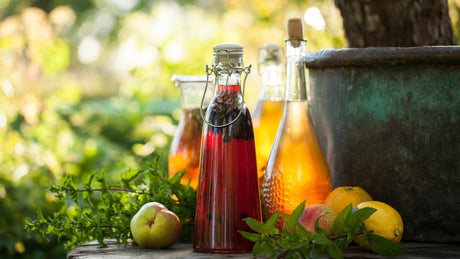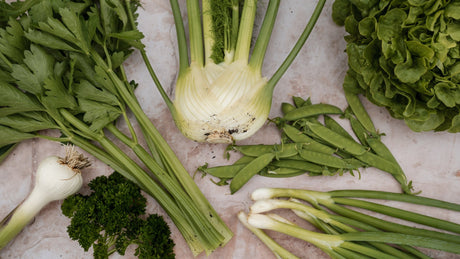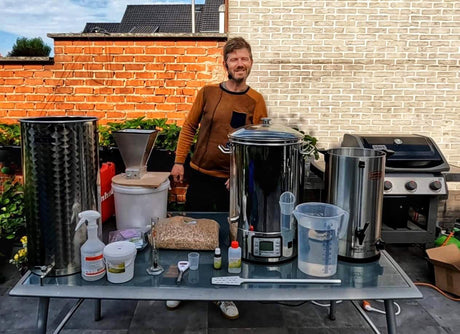A herb garden in your own garden for 12 months of spice on your plate
What could be more fun than pimping your dishes with fresh, aromatic herbs and spices from your herb garden? Not much! What makes growing herbs even more special is the fact that herbs are easy to grow and harvest. In fact, some herbs that you grow grow too well. After sowing, you often have to restrain them or even put them in a pot right away. In this article, you can read why herbs are so easy to grow. Pimp it up!

Which herbs are worth growing yourself in a herb garden?
You can grow almost all herbs, and this can even be done anywhere in your garden, herb garden, balcony or terrace: from the neat, neat vegetable garden beds to your borders. From square meter vegetable gardens to flower
pots . We make a distinction in growing herbs in:
- annual kitchen and garden herbs (last only 1 growing season): basil, coriander, dill
- biennial herbs (last 2 growing seasons, set seeds and die): chervil, parsley
- perennial herbs (survive for several years with good care): mint, sage, thyme, chives, fennel,marjoram , tarragon
When and where are herbs at their best
Product in the spotlight:

Organic enriched garden
compost 40L
Herbs like to be in a sunny and light place, with their feet in a well-drained, moisture-retaining soil. This soil may contain a lot of organic fertilizers. If you still have to start a vegetable garden when reading this article, think about how you can work
compost into your soil. You can buy
compost in bags at garden centers. You can also get larger quantities from
compost companies. You can often have large quantities delivered. You can also work with
organic fertilizer granules if you do not have
compost at hand.

Herbs in a sunny spot in the vegetable garden
Tips for a long harvest
- Sow herbs that germinate quickly. Coriander and dill only need 2 weeks to grow in spring and summer.
- Choose different types of herbs, with a variation in growing times. This way there is a constant growth and supply of fresh herbs.
- Plant herbs in pots (chives, mint, parsley, tarragon ) and place them outside in the summer. Bring the pots inside in the winter and place them on a windowsill where there is plenty of sunlight.
- Don't plant your herbs too far from your home. Make it easy for yourself when you want to harvest herbs.
- Plant the stronger herbs (such as sage, mint, rosemary) in larger pots .
- Start sowing in early spring. You do this best in the greenhouse or under glass.
- Grow some plants by sowing in trays ( greenhouse , your sunny kitchen windowsill...). As the plants grow, the soil outside will warm up.

Herbs can also be grown very well in
pots
Sow herbs all year round
Sowing herbs in January and February
Pre-sowing herbs indoors in February is best done with a
propagator in combination with one or more
grow lights to provide sufficient light after germination. Without these latter aids, it is better to wait until April. An extremely sunny March can still help you on the windowsill, but if you do not want to do wasted work, postpone your plans until April. Sow parsley indoors from January to February in
trays with 73 modules. The complete procedure can be found in
this article about growing parsley all year round .
Sowing herbs in March
In March, another
tray of herbs can be sown: chives, chervil, mint, coriander, parsley (again), rosemary, sage and thyme are next. I sow all types for indoors because of the frost that is still common at night in March. Some herbs can already be pre-sown in the
greenhouse or
conservatory . Look in the
vegetable garden calendar for March to see which ones (there is a logo of a
greenhouse or
conservatory ).
Sowing herbs in April
In April, basil,
dill and
tarragon will be added. We sow them directly in the
greenhouse or in the
garden house , parsley can also be sown directly outside. You can find a nice overview in
the vegetable garden calendar of April.

Herb garden plants from Moestuinweetjes are sent in recycled PET material
Herbs later in the year
You can do a
follow-up cultivation of your herbs later in the year, then you can sow them directly in the garden from May. Consult
the vegetable garden calendars on this site for more information. Do you want to enjoy your garden from May like me, practice other hobbies or have you had enough of pre-sowing? Then you can always buy young
plants in a garden center, the local BIO market or
our webshop . Carefully remove them from their packaging and plant them temporarily in
P9 pots so that the roots can grow a bit stronger. Place them in a warm and sunny place. Plant them out after the
Ice Saints .
kitchen herbs plants
Do not plant out young plants until they have had time to get used to the outside temperature (harden off).
- Make the soil sufficiently moist before planting.
-
Rake your soil and remove large clods of earth or stones, using a pitchfork .
- Carefully loosen the plants from their tray by gently pressing on the bottom. Remove plants from pots by giving a quick tap on the bottom with your hand or shovel.
- Be careful with the plant stems, they are still very fragile. Therefore, hold your plants by the roots or leaves.
- The top of the root ball should be just below the soil surface when you plant out.
- Earth up your herbs or use a layer of mulch. That way they never stand with their feet in the mud.
- When you have finished planting, give the plant some more water.
- Plants with shallow root systems dry out quickly so it is important to keep them well watered, especially if they are growing quickly.
Harvesting
Some herbs and even salads (coriander, rocket, cress) are often ready to harvest within a few days. Other herbs need a few weeks before they can be harvested. You can easily harvest herbs by pinching off what you need. If you want lush plants, it is best to prune the herbs before they flower.
Herbal guide
The links below will provide you with a wealth of information on how to grow commonly used kitchen herbs.
Possible problems
Coriander,
dill , basil, wild rocket can grow very quickly in dry, compact soil. Prune (read harvest) the plants regularly and water regularly.
If your herbs are in a
greenhouse , make sure there is sufficient ventilation. This will prevent fungal diseases from developing on the plants.
Downy mildew can affect your herbs. Mint rust can also negatively affect your
Marjoram and
savory , but other mint varieties are also sensitive to this. The rosemary beetle also likes lavender, sage and thyme. Protect your young plants from birds and snails with
bird nets or
snail pellets .

Downy mildew on basil

coin rust

 Organic enriched garden compost 40L
Organic enriched garden compost 40L Herbs in a sunny spot in the vegetable garden
Herbs in a sunny spot in the vegetable garden Herbs can also be grown very well in pots
Herbs can also be grown very well in pots
 Herb garden plants from Moestuinweetjes are sent in recycled PET material
Herb garden plants from Moestuinweetjes are sent in recycled PET material Downy mildew on basil
Downy mildew on basil  coin rust
coin rust

